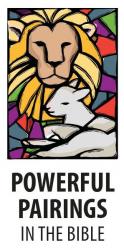
The book of Genesis is the story of beginnings: the beginning of creation, the beginning of a people, the beginning of salvation history. We find the bright shining thread of relationships throughout these stories of beginnings. Whether divinely created objects or people, nothing exists in isolation.
The very first chapter of Genesis presents the first story of creation. Out of the chaos (“the earth was without form or shape”), God is said to use six days for creation and one day of rest to savor it all. Days one, two and three are given to creating spaces or places — day and night, sky and water and then dry land. Days four, five and six tell us how those spaces or places are occupied by stars and planets, birds and fish and then animals and humans. A place or space is paired with its occupants.
While the ancient writers may not have had the scientific data we now possess, they knew from their experience and reflection that creation is a web of relationships. Everything exists because of God’s creative action, and each thing exists in relation to something else. Just as fish cannot exist without water, nor stars without a night sky, humans cannot exist without companionship.
To exist in relation to God and in relation to other beings is woven into our spiritual DNA. This environment of relationships is where meaning is discovered and made and where the image of God is revealed as we come to know ourselves. The stories of our spiritual ancestors often reveal the complexity of what it means to be fully human.
Adam and Eve stand at the start of our Bibles as an example of the complementary relationship between men and women. Both are made in God’s image, both are given the commission to fill the earth and both are found pleasing by God (Genesis 1:26-31). Both also are prone to reach beyond their capacities, to feed their egos rather than humbly obey God’s desires for them. When they disobediently eat from the tree of the knowledge of good and evil, they blame one another (and even a snake) rather than admit their fault (Genesis 3:1-13).
The Bible gives testimony through the story of Adam and Eve that free will can be used to draw us closer to God or pull us away from God. The same might be said of the story of their sons, Cain and Abel (Genesis 4:1-16). In this pair of brothers, the ancient writers find a way to identify and speak of the tensions that arise from envy. The older brother, envious of his younger brother’s gifts, murders him and seeks to hide it, asking God, “Am I my brother’s keeper?”
In fact, God’s people have always struggled with issues surrounding humility, obedience, envy and responsibility for others. The stories found in the early chapters of Genesis pre-date any written history. Instead, through the oral traditions of God’s people, we discover the remarkable way ancient peoples used their stories to instruct, admonish and encourage one another for generations.
Day and night, land and sea, Adam and Eve, Cain and Abel — these pairings help us reflect on the foundational importance of relationships as the context of our life with God.
Catherine Upchurch is the general editor of the Little Rock Catholic Study Bible and contributes to several biblical publications. She writes from Fort Smith.
Please read our Comments Policy before posting.
Article comments powered by Disqus Studio 3:16 offers new approach to teaching religion
Studio 3:16 offers new approach to teaching religion
 After three decades, NLR principal plans to retire
After three decades, NLR principal plans to retire
 CHS athlete overcomes odds to reach collegiate goal
CHS athlete overcomes odds to reach collegiate goal
 John Calipari: UA basketball coach and devout Catholic
John Calipari: UA basketball coach and devout Catholic
 'Cabrini' film tells story of saint with great faith
'Cabrini' film tells story of saint with great faith
 St. Joseph a model of solidarity with immigrants
St. Joseph a model of solidarity with immigrants
 Two gifts after Jesus’ death: Virgin Mary and Eucharist
Two gifts after Jesus’ death: Virgin Mary and Eucharist
 Why we have an altar, and not just a communion table
Why we have an altar, and not just a communion table
 Pope: Wars should be resolved through nonviolence
Pope: Wars should be resolved through nonviolence
 Living relationship with Jesus Christ in the Eucharist
Living relationship with Jesus Christ in the Eucharist